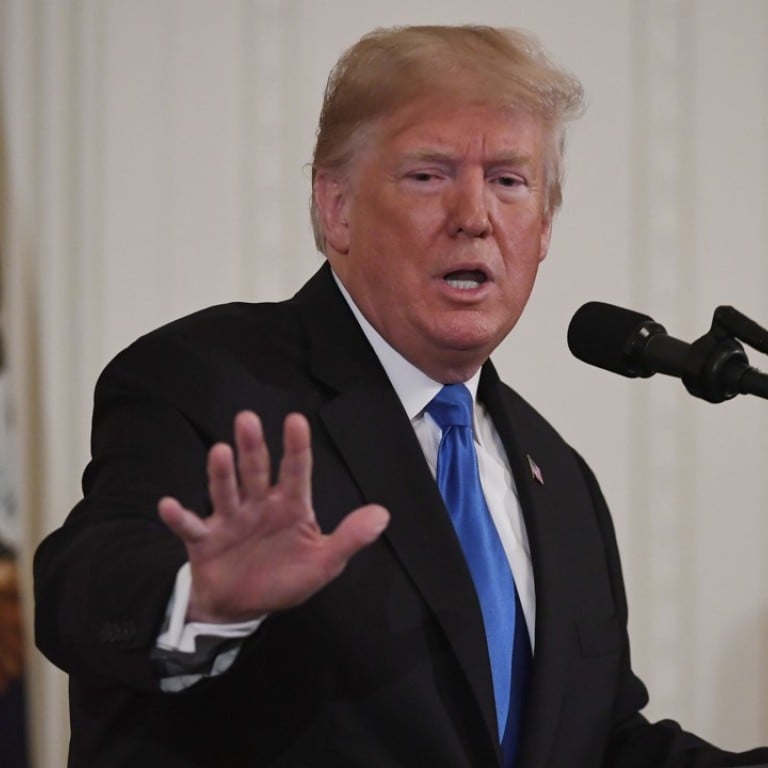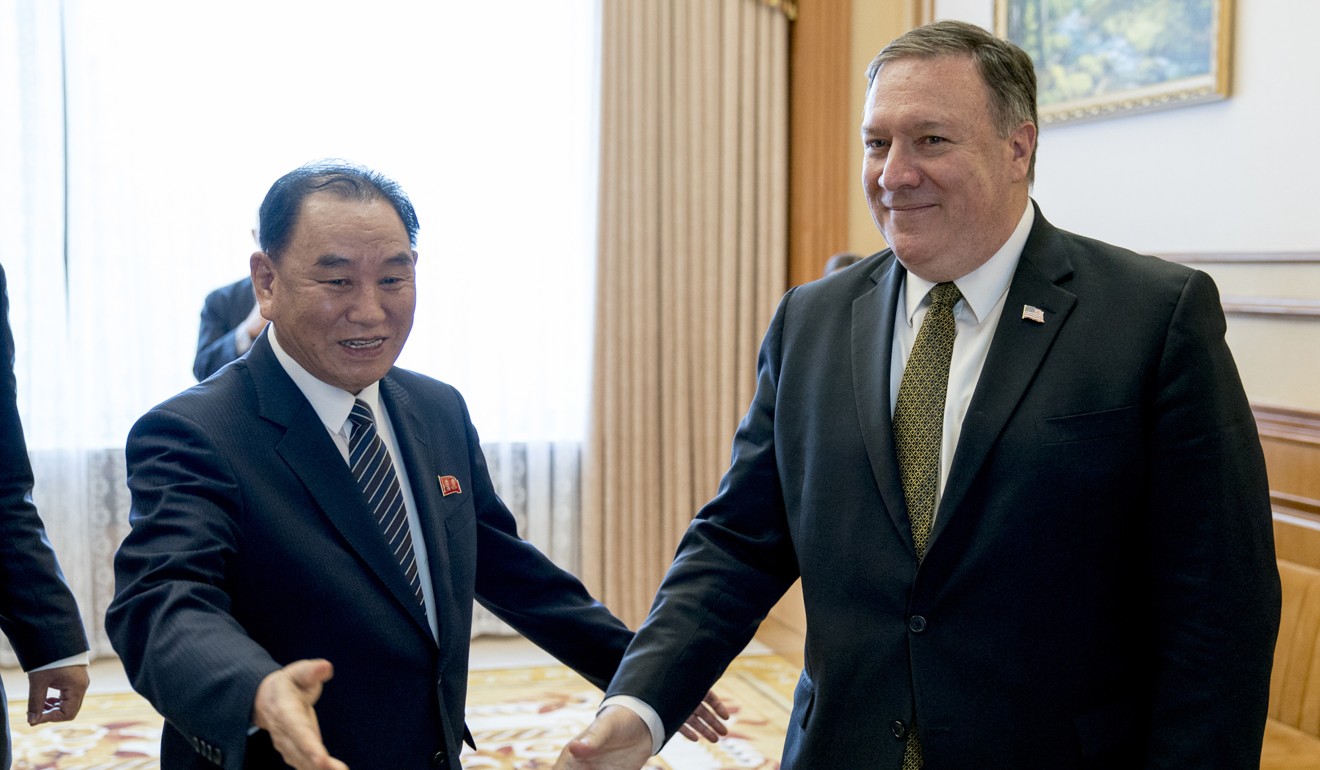
Donald Trump expects another meeting with Kim Jong-un ‘early next year’
- The president’s remarks came on the same day a scheduled meeting between Secretary of State Mike Pompeo and his North Korean counterpart were postponed
- Speculation that the delay may be the result of both sides wanting to avoid a failed negotiating effort
US President Donald Trump said on Wednesday that he expected to meet again with North Korean leader Kim Jong-un “sometime early next year”.
Trump also said a meeting this week between US Secretary of State Mike Pompeo and his North Korean counterpart, Kim Yong-chol, would be rescheduled. The meeting, which was supposed to have taken place on Thursday in New York, was intended to help pave the way for a second summit between Trump and Kim to discuss the denuclearisation of North Korea.

The US State Department said in a statement early on Wednesday that the meeting had been postponed, without stating a reason, raising concerns that talks could break down again.
The statement said the meeting would be rescheduled “when our respective schedules permit”.
“Ongoing conversations continue to take place,” the statement said. “The United States remains focused on fulfilling the commitments agreed to by President Trump and Chairman Kim at the Singapore Summit in June.”
Trump said at a White House news conference on Wednesday that the change was “because of trips that are being made,” but did not elaborate.
“We are going to make it … another day,” he said. “But we’re very happy with how it’s going with North Korea. We think it’s going fine. We’re in no rush.”
He expressed confidence that his second summit meeting with Kim would take place. “Some time next year, I would say. Sometime early next year,” Trump said.
Harry Kazianis, director of defence studies at the Centre for the National Interest, a Washington-based think tank, said he suspected that the abrupt postponement of Thursday’s meeting showed the two sides were struggling.
“It seems most likely talks were cancelled to spare both sides the negative press of a failed negotiation, as North Korea and Washington seem very far apart on a viable path forward on denuclearisation,” Kazianis said.
“The North seems quite angry that the Trump administration has not detailed any ‘corresponding measures’ when the Kim regime offered during the third Inter-Korean summit to close their Yongbyon nuclear facility,” he said.
Daryl Kimball, executive director at the Arms Control Association, echoed that opinion.
“Neither side appears to be ready to take the necessary action-for-action steps on denuclearisation and peace that would move the process along,” Kimball said.
“The North Koreans continue to express their frustration with what they see as the failure of the United States to consider easing some international sanctions, or agree to a political declaration on the end of the war, in exchange for additional meaningful steps toward verifiable denuclearisation, such as the decommission of North Korea’s Yongbyon nuclear complex,” he said.
Watch: North Korea shifts diplomatic strategy
Both sides will need to adjust their positions if there is to be meaningful progress in the negotiations, Kimball added.
Last Friday, Pyongyang threatened that it could revive its nuclear program if the US did not lift economic sanctions.
The North Korean Foreign Ministry said in a statement that the “improvement of relations and sanctions is incompatible”.
“The US thinks that its oft-repeated ‘sanctions and pressure’ leads to ‘denuclearisation.’ We cannot help laughing at such a foolish idea,” it said.
Pyongyang has rejected the notion of unilaterally dismantling its nuclear weapons, demanding “corresponding measures” from the US side, such as sanction relief, before it takes further denuclearisation steps.
“Without any trust in the US,” North Korean Foreign Minister Ri Yong-ho said during the United Nations General Assembly meeting in late September, “there will be no confidence in our national security, and under such circumstances there is no way we will unilaterally disarm ourselves first.”
China and Russia have also been vocal about asking for “adjusted sanctions” against North Korea.
Early last month, the three countries’ deputy foreign ministers met in Moscow to coordinate an approach to the Korean denuclearisation process and called on the UN Security Council to “adjust” the sanctions against Pyongyang.
Pompeo and Kim Yong-chol met in New York in late May to prepare for the first summit between their countries’ leaders in Singapore in June.
Preparation for the second Trump-Kim summit was expected to be on the agenda between Pompeo and Kim Yong-chol as the White House has been coordinating on the schedule and location for the leaders’ meeting.
Kristie Kenney, a US State Department counsellor and former ambassador to Thailand, the Philippines and Ecuador, said North Korea would hold the key for Trump to claim “some big wins” after the US midterm elections on Tuesday.
“I think the president is still optimistic and upbeat after his Singapore meetings with the North Koreans, and I think he’s going to want to see real progress,” Kenney told an Asia Society round table in New York on Wednesday. “Despite today’s meetings being cancelled … I think you’ll see a strong presidential push for a second summit … early in the year.”
Kazianis worried that if the talks failed, Pyongyang could resume nuclear and missile tests.
It “could again start testing missiles, and more specifically, long-range intercontinental ballistic missiles (ICBMs) that can hit the US homeland”, he said.
“If talks were to collapse, and I would argue at this point we are a long way from that point,” he said, “it seems most likely the North would want to test at least one ICBM to show it has the full range and technological sophistication needed to strike a US city.”
Additional reporting by Jodi Xu Klein and Robert Delaney

